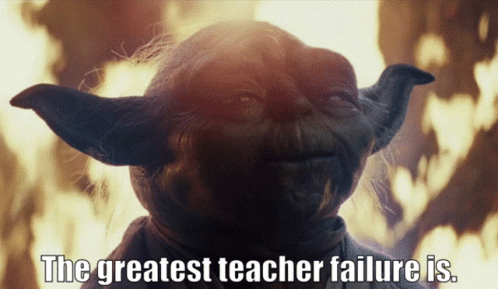Someone who makes a mistake during production may or may not be tasked with fixing it. It might require a filmmaker with more experience to take the lead—thus, a teachable moment presents itself. Whether or not that translates into an actual learning opportunity depends on an individual’s willingness to own their mistake. To do so requires humility, self-awareness, and honesty—with everyone, including oneself. In other words, integrity.
Some people never get passed their own cognitive biases and keep making the same mistakes over and over again. This stems from an inability to be honest with themselves, reinforcing their biases and fueling their egos. Such individuals may become technically proficient elsewhere in the process. Still, their unwillingness to learn from their biggest mistakes and/or acknowledge their own weaknesses gets rewritten in their memories as they continue to repeat them and disregard anyone who dares to suggest a better/more efficient way of doing something—such as an established technical or industry standard. This is the way of the faux-pro (“faux-professional”).
What others recognize as stubbornness and foolish pride is simply rebranded in the faux-pro’s mind as “doing things my own way” or “establishing a new paradigm,” often justified with repeated clichés like, “Sometimes you’ve got to break the rules.” They fail to recognize the difference between experimenting with new techniques within an established framework and trying to cut corners or take shortcuts that will undermine their own efforts.
For example, a scene in a motion picture will typically change shots every five-to-ten seconds. Cutting from one person to another during dialogue, maintaining a consistent angle for each character, never exceeding a typical duration. This is one of those artistic “rules” established over a century of narrative filmmaking—but it isn’t carved in stone, it’s not included in any contract, nor does any union mandate it.
An amateur filmmaker who doesn’t understand that “rule” might break it unintentionally, resulting in a confusing final edit that momentarily distracts the audience and ruins the experience of the film.
A filmmaker who does understand the “rule” may intentionally break it for dramatic effect. Chaotic, emotional dialogue can be well served by randomized, atypical camera angles, heightening the audience’s emotional response to the scene. An extended, single take on a character struggling to concentrate on the events around them can elicit discomfort in the audience.
However, when the “rules” that are being broken are actual rules, like labor laws or the laws of physics, it doesn’t usually end well for the self-styled “rebels” doing their “own thing.”
Faux-pro filmmakers are everywhere. They’re very good at creating notoriety for themselves—typically limited to their own sphere of influence—with a visually impressive resume/C.V. A quote attributed to Stalin—or an American Defense consultant in the 70s, depending on who you ask—seems apropos when taking only a cursory glance at a faux-pro’s IMDb page: "Quantity has a quality all its own."
It’s important to remember that a demonstrable lack of integrity does not necessarily indicate a moral failing—an ethical deficiency, perhaps—but, as stated above, such a deficit goes hand-in-hand with a lack of self-awareness. A personality trait with myriad potential root causes that this writer is not qualified to examine.
However, integrity is vital to maintaining a sustainable career in any industry. Especially one that relies heavily on expansive collaboration between multiple disciplines with time-sensitive workflows. Faux-professionals are quite good at freezing themselves out of such opportunities, but they can still affect others they work with, who—upon breaking an actual rule—may feel the pain of being fired from an industry project because they never learned how to own their own mistakes. This doesn’t mean that they can’t still learn. Breaking bad habits and understanding the distinction between personal and professional judgments is still possible. Opportunities to examine one’s mistakes and failures should not be squandered with self-pity when so much can be gained from self-reflection.
One may even learn to appreciate the “wasted” time appealing to the egos of faux-pros. Not everyone gets a front-row seat to a demonstration of how not to do something. Limiting one’s judgment to the criteria demanded by professionalism can also help put the faux-pro’s unfortunate habits into proper perspective. They may be self-serving narcissists dispelling bad advice and empty promises, but that does not make them quantifiably evil.
In the words of Robert J. Hanlon:
"Never attribute to malice that which is adequately explained by stupidity."Founder/Administrator
Utah Filmmakers™ Association
| The opinions expressed in this blog are those of the authors and—especially where guest posts are concerned—do not necessarily reflect the official policies and/or practice of the Utah Filmmakers™ Association, its officers and/or associates. |







